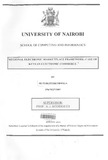| dc.description.abstract | Electronic marketplace is a major enabler of electronic commerce. Being the environment in
which exchange of goods and services take place, its organization and setup determines the
growth of electronic commerce in a given region. With the emergence of digital economy,
electronic marketplaces will be the driver of economic growth for developing countries. It will
be the tool to enable firms, especially small and medium enterprises (SMEs), in developing
countries reduce their cost of operations thereby easing the access to global market. Previous
research however points out that developing countries have not yet derived expected benefits
from this technology. The adoption, proliferation and maturation of electronic commerce in this
region has been slow due to infrastructure, social and cultural challenges.
For developing countries to tap into expected benefits, there is need for creation of a suitable
trading environment where this form of business can thrive better. This is achievable through
creation of an independent trading exchange or the electronic marketplace. Due to challenges
developing countries face, there is need for frameworks that would fit with their current
infrastructure, regulatory framework and social cultural perspectives in these countries. Previous
research work on this area is scarce and provides only fragmented insights into the area. Mostly
it's a generalization of developing countries yet it is clear the challenges faced by each region
are different and in some cases, unique to the region. There is need therefore, to consider a given
region and domesticate existing frameworks or even develop new ones to fit in the region.
The research problem of this project was designed to investigate and analyzing Kenyan situation
on business-to-business and business-to-customer electronic commerce, by looking at the
adoption and proliferation of electronic marketplace, their maturation level and coming up with
suitable framework that would improve this emerging technology in trading. The research
design was a combination of descriptive survey and case study to further understanding of
contribution of electronic marketplace in enabling electronic commerce in the region. There was
no existing framework that was found suitable in our environment, hence a new one was
formulated that resolves identified barriers to use of electronic marketplace for trading. The
framework should be adopted as the reference framework for developing and management of
sustainable electronic marketplace with a possibility of collaboration among businesses with
existing relationship. | en |

